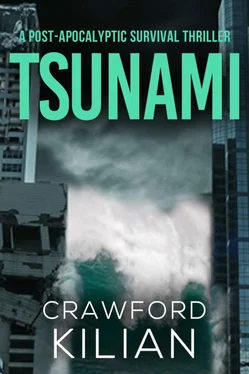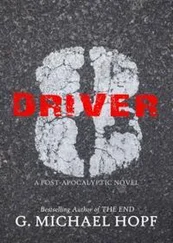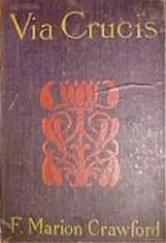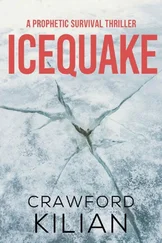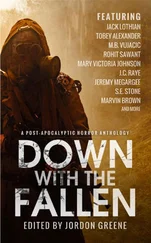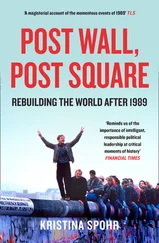“The silly bastard shot at me too.”
“Oh, for God’s sake! You should have told me.”
“So should you.” She gave him a gentle hug. “I think I like you when you’re a little less confident than usual. Makes you almost human.”
“Belt up. The point is that it’s getting too dangerous here. I think we ought to go back to Vancouver.”
“What? After swearing you’d never darken your grandfather’s door again? And all the moaning about how there’s not enough work for us there?”
“At least you don’t get shot at. Well, what do you think?”
“We can’t, not yet. I’ve got Sam’s case to see through, and we can’t just walk away from all those thousands of casualties and homeless people. I’d feel terrible if we did. Let’s tough it out a little longer. All right?”
Reluctantly, he nodded. They went to bed and fell asleep in each other’s arms.
Two hours later, light glared in their eyes. Don sat up and saw Kirstie squinting and blinking. Her face and throat were sunburned.
“What—?”
“Power just came back on,” he said. “I’ll go turn things off.”
The refrigerator hummed reassuringly. Don shuffled about, turning out lights and checking the locks. A drunken voice down the street called out: “Happy New Year!” Five or six shots rattled suddenly, and a dog barked frantically.
When he returned upstairs, the bedroom was dark again.
“I turned out the light when they started shooting,” Kirstie whispered. “Christ almighty, we can’t let all this stuff just go on.”
“No.” Standing back from the window, he looked out at the bay again. San Francisco was still dark; street lights burned blue or orange all over Berkeley, and many windows glowed yellow. The air was sour with smoke, and the sky still pulsed orange from the fires.
The street lights brightened suddenly, then dimmed and went out.
“Bob Tony, it’s the end of the world.” Ted Loeffler stared past the clicking windshield wipers at the crowded freeway.
“Yeah. Ain’t it a bitch?” Allison slumped a little lower in the seat of Ted’s station wagon. Rain drummed on the roof and pooled on the pavement. The Hollywood hills were grey-brown blurs on either side as the car crawled through Cahuenga Pass from the San Fernando Valley. “You see Long Beach when you were coming in?”
“No, but I sure as hell saw Malibu.” Mile after mile of mud and wreckage and an occasional house somehow spared by an accident of topography, and above the wave line the rusty beige of the dead chaparral on the mountainsides.
“Half the industry. Bob Tony. Half the fucking movie industry, wiped out in two minutes. Christ, you’re practically the oldest filmmaker left in California.”
“How’s Suzi?” Allison asked. “And Ken?”
“Okay. Scared shitless, but okay. The flooding, the slides, you should see it on TV. Suzi nearly went out of her tree when you called, she was sure I’d get washed away before I ever got near the airport. Ken was pissed off ’cause I made him stay home. He wanted to see the sights.” Ken was the Loefflers’ thirteen-year-old; Allison was fond of the boy, who reminded him of himself.
“Is that what all these people are doing — sightseeing?” Allison wondered.
Ted laughed, showing big yellow teeth. “Looking for an open gas station so they can gas up and go looking for a quart of milk. Absolute chaos. Thank God they got the power right back on. We got three freezers full of stuff, another day and it would’ve been garbage.”
“Listen, Ted. We have to suspend The Longrangers . For the duration.”
“This is not a shock.” They were passing the Hollywood Bowl, and it was raining harder than ever.
“No. And it’s going to be a long duration. Maybe years.”
Ted’s long, homely face twisted. “Looks that way, kemo sabe.”
“You know, Ted, this is no standard California disaster. This is it, the big one. By the time the government gets a grip on things again, a lot of people will be dead. Any looting here?”
“Sure. Watts, Compton, all the black areas.”
“What happens when they get hungry again? And other people get hungry? Blacks aren’t the only people with a little enterprise. And no food in a city of eight million people?”
“I’ve got a gun.”
“Every son-of-a-bitch in L.A. has a gun except me, and I’m working on it.”
“Okay, okay. You got a plan, so tell.”
“I think we can hole up at the ranch and ride this out. We’ve got some resources now, and I’ll be getting more. The neighbours are scattered and pretty self-sufficient, too, and shouldn’t be a problem. Monterey and Carmel are wrecked all to shit, but the army’s already patrolling. Remember Ernie Miles from Fort Polk? He’s the CO at Fort Ord now, and he really moved fast yesterday. Declared martial law from Monterey to Salinas, got his troops out there, and kept things calm. He’s a good guy to know. He had his MPs on duty at the airport, and they didn’t want to let me charter the plane. But I got him on the phone and he personally authorized the flight.”
“I love him, I love him. Well, look, let me talk to Suzi, okay? It sounds like a basically good idea. Not as good as making sixty million dollars, but good.”
Allison turned on the car radio. It already felt like luxury to hear a news broadcast; all of central and northern California had been blacked out since the waves, but Los Angeles still had power. For now.
The waves were already old news; now the stories were about floods in the hills, fires in Long Beach and Watts, the countless injured people overcrowding the hospitals. Most of the news from the east was about governmental determination to cope with the disaster. Tsunamis had also hit several places along the east coast: a hundred people were reported missing on the south shore of Long Island, parts of New York City had been flooded, and Boston’s waterfront was wrecked.
Allison felt a sombre satisfaction at the economic news. Several major banks had suspended operation for at least a week. Gold and silver prices were shooting up, with gold at close to a thousand dollars an ounce — up three hundred dollars in a day. With almost a thousand ounces of gold carefully hidden in his house, Allison had become suddenly richer. The New York stock market hadn’t opened today; a full-scale panic had erupted in the stock markets of Tokyo, Hong Kong and London.
Ted turned south on La Cienaga. Most of the art galleries and boutiques were closed, early victims of the depression, but the street still had some class. In the seven-hundred block stood a four-story block of marble and black glass; Ted pressed a button on the dash, activating an automatic gate, and drove into the building’s underground garage.
“We’re in luck,” he muttered. “Last time the gate wouldn’t open. The flares burned it out.” He parked in his usual slot, next to the company sedan, a new Nissan. Not many other cars were there; fluorescent lights flickered on bare, oil-stained concrete.
“Thanks, Ted. You go on home, look after Suzi. I’m going to make some phone calls. Then I’ll take the Nissan home.”
“What about dinner? You want to come over for dinner?”
“No, no — Suzi’s got enough trouble without me. I’ll eat at home. But I’d like you both, and Ken — all of you — to come over tomorrow morning. Ten o’clock. Okay?”
“Sure, Bob Tony.”
Allison gripped Ted’s hand. “Thanks. See you then.”
The Pontiac growled back through the electronic gate while Allison took the elevator to the third floor.
He took pride in running a multimillion-dollar production company from a six-room office suite. The decor was lived-in elegant, with some lovely Ben Shahn originals hanging above battered Edwardian armchairs. Allison let himself in and walked to his office without bothering to turn on the lights. The office was eclectically furnished: an antique roll-top desk, three wingback chairs, a whole wall of VTR equipment including a large TV projection screen, and a word processor. Rain slithered down the big windows overlooking the street.
Читать дальше
